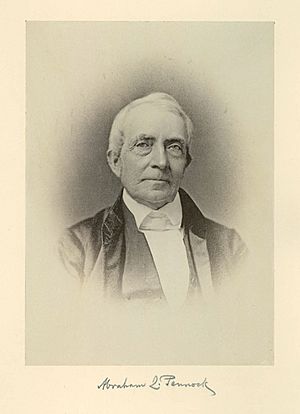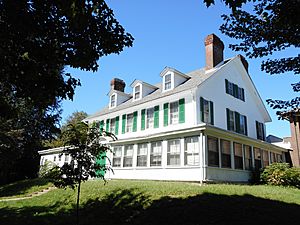Abraham L. Pennock facts for kids
Quick facts for kids
Abraham L. Pennock
|
|
|---|---|
 |
|
| Born |
Abraham Liddon Pennock
August 7, 1786 |
| Died | May 12, 1868 (aged 81) |
| Occupation | Abolitionist, inventor |
| Organization | American Anti-Slavery Society |
Abraham Liddon Pennock (born August 7, 1786 – died May 12, 1868) was an important American. He was an inventor and a businessman. He was also a strong supporter of ending slavery, known as an abolitionist.
Pennock was a leader in the free produce movement. This movement encouraged people to buy products that were not made using enslaved labor. He also served as a vice president for the Pennsylvania Anti-Slavery Society. A special historical marker in Upper Darby Township, Delaware County, Pennsylvania honors him. It was placed there on October 24, 1985.
Contents
Life and Work
Pennock was born in Philadelphia on August 7, 1786. His parents were George and Mary Liddon Pennock. He inherited a gristmill (a mill for grinding grain) and other family wealth.
Inventing and Business
Abraham Pennock was involved in many businesses. He invested in dry goods, like fabrics and clothing. He also co-owned the Philadelphia Hose Company. This company made special riveted leather hoses.
Pennock and his partner, James Sellers, invented this strong hose. It was first used at Pennock's mill. This type of hose was very popular for a long time. It was used until rubber hoses were invented. The company also built fire engines. The hoses were so strong that the U.S. government hired the company. They made all the mail bags for the government.
In 1840, Pennock stopped working in business. He moved to Haverford Township, Delaware County, Pennsylvania. Later, in 1845, he moved to Upper Darby Township, Delaware County, Pennsylvania.
Patent Challenge
In 1829, Pennock was part of a big court case called Pennock v. Dialogue. The Supreme Court of the United States made a decision in this case. They said that Pennock's patent for his riveted leather hose was not valid. A patent is a special right that protects an invention. Pennock and James Sellers had invented the hose in 1811. But they waited until 1818 to apply for the patent. The court decided they waited too long.
Fighting for Change
Pennock was a devoted Quaker. Quakers are a religious group known for their peaceful beliefs. He supported many important causes. He believed women should have the right to vote. He also supported temperance, which meant reducing or stopping the use of alcohol. Most importantly, he worked to end slavery.
The Underground Railroad
Pennock was active in the Underground Railroad. This was a secret network that helped enslaved people escape to freedom. He also helped start the Free Produce Association in 1827. This group was a network of businesses. They sold cotton and other products that were made without enslaved labor.
Pennock voted for the Free Soil Party and the Republican Party. These parties were against slavery. This was different from some other Quakers. They believed in ending slavery through "moral persuasion" (convincing people with ideas), not through voting.
Pennock also helped start a newspaper called Non-Slaveholder. It was the only newspaper focused on the free produce cause. He helped edit the paper from 1846 to 1847. The paper stopped publishing in 1850 because it did not have enough readers.
Many famous people visited Pennock's home. These included George Thompson, James Russell Lowell, Theodore Dwight Weld, and John Greenleaf Whittier. They were all important writers and activists.
Leaving the Anti-Slavery Society
In 1841, Pennock resigned from his role. He was the vice president of the Pennsylvania chapter of the American Anti-Slavery Society. This happened after a disagreement at an international meeting. The American society sent both men and women to a convention in England. But the British society only allowed men to be delegates.
The American society was very upset. They said the British behavior was "arbitrary and despotic" (unfair and like a dictator). Pennock did not agree with this strong language. He felt the movement should focus only on ending slavery. He did not want to add other issues, like women's equality, to the fight. So, he resigned.
Haverford College
Pennock was also involved with Haverford College. This is a private college with Quaker roots near Philadelphia. He served as the secretary (like a president) of the college's board of managers. This was from May 14, 1835, to May 8, 1837. He was also a member of the board from 1830 to 1841, and again from 1844 to 1852.
Family Life
In his later years, Pennock lived at Hoodland Farm. This was a large house built in 1823. His wife, Elizabeth, inherited it from her father, John Sellers II. The farmhouse is in Upper Darby Township, Delaware County, Pennsylvania.
Pennock married Elizabeth Sellers on June 7, 1810. They had nine children: George, Mary C., John S., Joseph L., Sarah, Ann, Casper, Abraham L., and Isabella.
Abraham Pennock passed away at Hoodland on May 12, 1868. Elizabeth Pennock was born on August 26, 1791. She died two years after her husband, on June 17, 1870, also at Hoodland.
A Pennsylvania state historical marker was placed at Hoodland on October 24, 1985. It honors Abraham Pennock.
See also
- List of Pennsylvania state historical markers in Delaware County
 | Madam C. J. Walker |
 | Janet Emerson Bashen |
 | Annie Turnbo Malone |
 | Maggie L. Walker |


